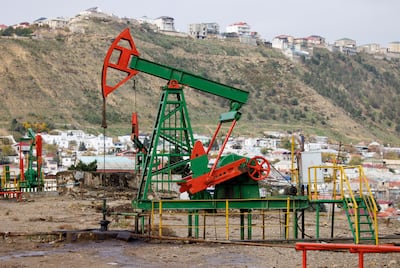Cop29 negotiations are moving too slowly, Azerbaijan's lead negotiator Yalchin Rafiyev said on Friday, as the UN climate summit nears its halfway mark.
"We cannot afford to leave too much ground to be covered later in the summit at the political level. We are urging everyone to intensify their engagements and remain focused on the imperative to make quick progress," Mr Rafiyev told a media briefing.
His remarks came as former UN secretary general Ban Ki-moon, along with other former UN chiefs, called for a restructuring of the climate talks, which needed to "shift from negotiation to implementation".
In an open letter to the UN, they said this would enable "the Cop to deliver on agreed commitments and ensure the urgent energy transition and phase-out of fossil energy".
Azerbaijan's Energy Minister Parviz Shahbazov outlined progress on renewable energy deals during Cop29.
"We laid the foundation for the first industrial-scale solar power plant of 240 megawatts," he told the media, referring to a partnership with BP and Socar that will support the decarbonisation of Azerbaijan's oil and gas industry.
He also announced the signing of a strategic partnership between Azerbaijan, Kazakhstan and Uzbekistan that will look into the development and transmission of green energy.
Another three agreements were signed with six Chinese companies, with the financial close of two solar power plants expected to take place over the weekend. Each deal aims to bring Azerbaijan closer to its goal of increasing renewable power capacity to 30 per cent by 2030.

Oil demand expected to slow in 2025
The race to renewables is a key focal point at Cop29 on the road to net zero.
The International Energy Agency (IEA) this week predicted that global oil supply will outpace demand by more than one million barrels per day in 2025. "This compares with the last year, which is about 2 million barrels per day, and the historical average of about 1.5 million barrels per day, showing the global oil demand is getting weaker," Dr Fatih Birol, executive director of the International Energy Agency, told the media.
Still, global carbon emissions from fossil fuels are expected to reach a record high in 2024, according to research released this week by the Global Carbon Project.
Despite the clarion call to cut emissions from the global scientific community, researchers at the Global Carbon Project say there is still “no sign” that the world has reached a peak in fossil CO2 emissions.





